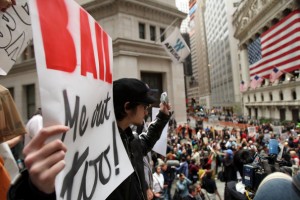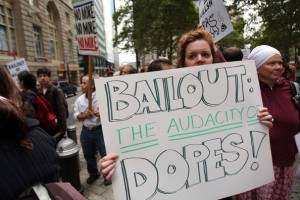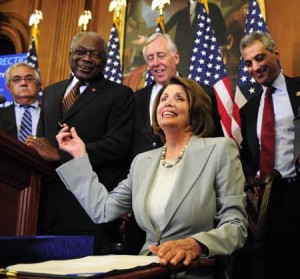Stimulus
Government Bailout
Obama Stimulus Package
As defined in economics, a financial bailout is granting a loan or giving capital to a country, a company or an individual in an attempt to save it from to total liquidation or bankruptcy. This method is also a way to allow an entity to fail gracefully rather than in complete ruin as a way of saving face.
Taxpayers would always wonder why a country would seek financial bailout when federal tax or state tax payments are regularly monitored by a tax collecting organizations such as the Internal Revenue Service (or IRS). With the different tax breaks (tax exemptions, tax write off, tax credit and tax deductions), income taxes are so reduced to almost zero dollars for most that the accumulated federal tax or state tax payments are not enough to support the country or the state.
Financial bailout is not just a method to salvage a losing company or country. Veteran players in the financial market are playing the money game to make more dollars by using financial bailouts to secure entities that can in turn be reinvented and gain long term profit in the process. Many businessmen would bailout a struggling company, buying shares for lower rates and would eventually make strategic plans in lifting the company up to its former glory. An entrepreneur would seek out non-profiting food companies and bail it out to reinvent it and create more revenue as well as jobs. Acquiring a business will all depend on the financial report to see the insolvency or the real financial status before decisions leading to a financial bailout can take effect.
Countries seek financial bailout when there are plans of building infrastructure or big budgeted projects in transportation and communication that accumulated federal tax or state tax cannot support. This can be controversial as attested during the 2008 U.S. Auto-Industry Financial Bailout.
The U.S. federal government is criticized by economists and lobbyists every time bailouts are given, calling it corporate welfare. During fiscal years, the government gives billions of dollars to selected companies or corporations, giving out favorable treatments and money grants as well as giving out tax breaks. The U.S. government was also known to grant zero-interest loans from the Federal Reserve System to finance institutions during the global financial crisis. It has been reported that approximately forty to fifty billion dollars are annually provided by the state and local governments for economic development incentives that many view as corporate welfare or subsidies that are oftentimes corrupted through unfair lobbying of corporations.
Financial bailouts work on certain principles that are prevalent throughout the course of recent history. To help with liquidity issues, central banks provide loans to businesses and individuals. Insolvent organizations or those entities that are unable to sufficiently fund their short-term obligations are helped fail in an orderly manner. If the government decide to take interest in bailing out an entity, assistance from accumulated federal tax or state tax payments are needed, guaranteeing that taxpayers will eventually benefit from it when the government will obtain the finds and later on issue common stocks that will be open to the public before the bailed-out entity becomes privatized.
Dividend payments are prohibited to ensure that taxpayer’s money are used to strengthen the bank and for loans rather than use the investors’ money. To help revive the economy, interest rates in lending are cut down. Takeovers after bailouts are done by first replacing or manipulating the board or management of an institution. Full financial reports are prepared to understand the true financial situation of the entity.
Financial bailouts may be an answer to a struggling company’s dire straits but there are dangers and consequences that should be anticipated. Business standards will be lowered when big companies are involved in the bailout. There would be moral hazards by creating numerous safety nets for assurance purposes. For counties and governments, there will be a corporatist style of management that will use the state’s power to design higher mandatory federal tax or state tax payments from taxpayers.
During economic crisis, when stock markets and banking systems fail and/or collapse and the government funds are almost diminished, entities seeking financial bailout spread like a disease. The saving attempt may or may not be successful since everything will depend on the real, unadulterated financial status of the entity upon review before further steps will be taken. When the only option is a financial bailout, the government and eventually accumulated federal tax and/or state tax from taxpayers will shoulder the direct cost to recoup from the economic crisis.
To find out more about The federal bailout Click Here





